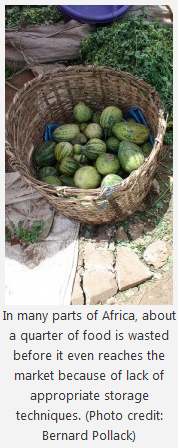 When was the last time you took a look at the back of your refrigerator? Way in the back—where the three-week old Chinese takeout leftovers are hiding. It’s not pleasant, is it?
When was the last time you took a look at the back of your refrigerator? Way in the back—where the three-week old Chinese takeout leftovers are hiding. It’s not pleasant, is it?
In the United States, an estimated 27 percent of all food available for consumption is thrown away. Food waste amounts to about 30 million tons in a year and accounts for 12 percent of total waste produced by the country in a year.
Food waste is also contributing to global warming. Rotting food produces methane, a green house gas that is more than 20 times as potent as carbon dioxide. In the United States, rotting food in landfills accounts for 34 percent of the country’s total methane produced. It is estimated that if all food waste in the United States was eliminated, it would be the equivalent of removing a fourth of all the cars in the country from the roads.
Meanwhile, as per capita food waste has increased in the United States by 50 percent since 1974, in some parts of Africa, over 40 percent of crops go bad before they can be eaten. Lack of proper storage, transportation, infrastructure, crop diseases and pests all work against smallholder farmers—many of whom live on less than a dollar per day. In the U.S. we are throwing away cheap food by the tons, while in Africa—the epi-center of world hunger—people are losing tons of food before it can make it to the table.
Now I’ve got you standing with the refrigerator door open, smelling that soggy take out container and feeling guilty. Well, the good news is that there are a lot of ways we can work on reducing waste. And none of them have to start with you eating that unidentified, fuzzy green stuff you had forgotten about.
Organizations like the UN Food and Agriculture Organization (FAO) are working abroad to implement projects providing education and technology. In Kenya, FAO partnered with the Kenya Ministry of Agriculture to train farmers to take steps to reduce maize crop loss from mycotoxin, a devastating result of fungi growth. And the African Ministerial Council on Science & Technology is promoting research to analyze and promote various technologies and techniques to prevent post-harvest waste and improve food processing.
What we can offer these organizations is our support.
It is good to try to reduce your waste at home—don’t buy more than you actually need, start composting your table scraps, and encourage your local grocery store to donate leftovers to food banks and homeless shelters. But we can do even more: put pressure on governments, funders, and non-profit organizations working here at home and abroad. Remind them that humanity already produces plenty of food to feed everyone in the world. Now all we have to do is put it all to good use.
Molly Theobald is a research fellow with Nourishing the Planet.

Danielle Nierenberg, an expert on livestock and sustainability, currently serves as Project Director of State of World 2011 for the Worldwatch Institute, a Washington, DC-based environmental think tank. Her knowledge of factory farming and its global spread and sustainable agriculture has been cited widely in the New York Times Magazine, the International Herald Tribune, the Washington Post, and
other publications.
Danielle worked for two years as a Peace Corps volunteer in the Dominican Republic. She is currently traveling across Africa looking at innovations that are working to alleviate hunger and poverty and blogging everyday at Worldwatch Institute’s Nourishing the Planet. She has a regular column with the Mail & Guardian, the Kansas City Star, and the Huffington Post and her writing was been featured in newspapers across Africa including the Cape Town Argus, the Zambia Daily Mail, Coast Week (Kenya), and other African publications. She holds an M.S. in agriculture, food, and environment from Tufts University and a B.A. in environmental policy from Monmouth College.








